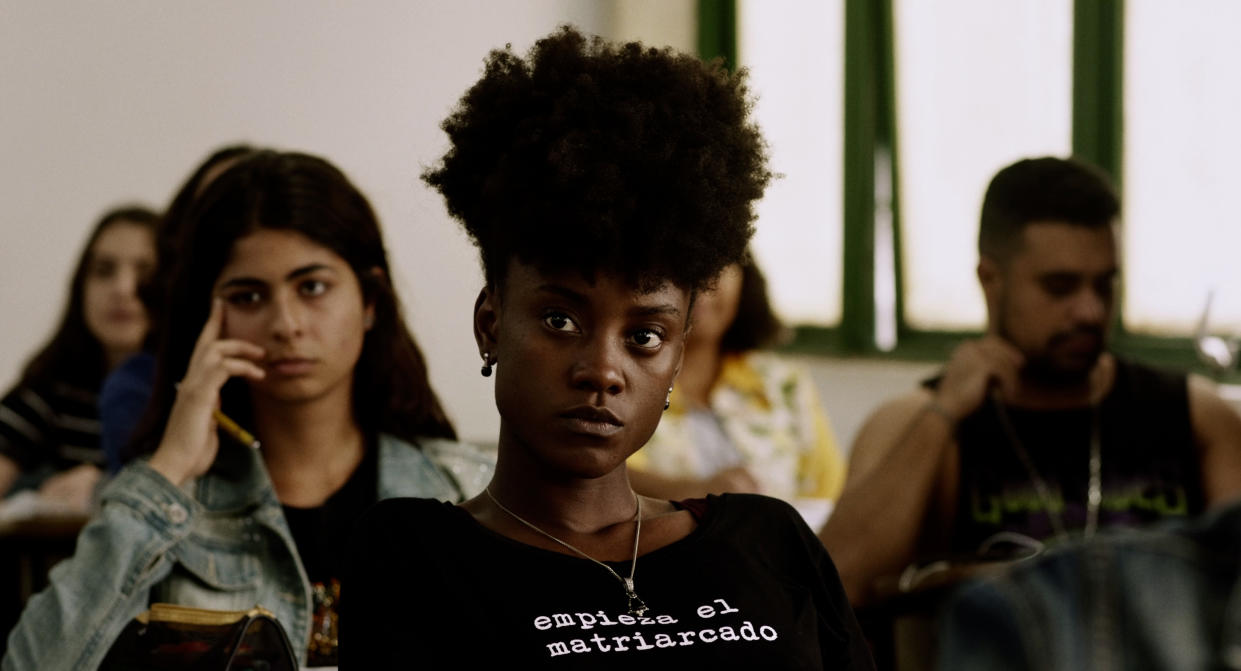‘Mars One’ Review: Gorgeous Brazilian Drama Reflects a Working-Class Family with Care


Sometimes, the simplest stories are the most monumental. A boy wants to be an astronaut, a girl falls in love, a father lives out his dreams through his son. This is the stuff of life — nothing more, nothing less. Watching a film like “Mars One,” from Brazilian filmmaker Gabriel Martins, is a humbling experience. Why over-complicate this business of storytelling when one can make such moving magic out of everyday experiences?
Set in the wake of the election of Brazil’s former far-right president Jair Bolsonaro, “Mars One” follows a single working-class family as they long for more, love each other, self-reflect, and struggle to make ends meet. Where a lesser film might pick one character to focus on, “Mars One” All relatable, flawed, and charming in their own ways, they antagonize each other without anyone losing their humanity.
More from IndieWire
Martins strikes a delicate balance that’s unusually satisfying from a narrative perspective. It’s refreshing to witness characters grow outside the traditional beats of most American dramas. There is an abundance of heroes’ journeys in waking up every day and pushing past surviving to thriving.
The film opens with cries of celebration for Bolsonaro’s win echoing in the background as a young boy lies bathed in blue light, gazing up at the stars. This is Daivid (Cícero Lucas), affectionately called Daivinho by his family, a promising soccer player whose real dream is to become an astrophysicist and join the Mars One mission. Leaning over the top bunk to interrupt his reverie is his older sister Eunice or Nina (Camilla Damião), a college student impatient to move out and start her life apart from her family. When Daivid fears that Nina will forget about him, she teases: “You want to go to Mars, and you worry about me moving far away?”

ARRAY Releasing
Not that Nina has much reason to run away. Her mother, Tércia (Rejane Faria), is warm and lively, spending her nights dancing and her days laughing with the clients whose houses she cleans. As the loving patriarch, Wellington (Carlos Francisco) is obsessed with football, nursing professional dreams for Daivid as he dutifully attends AA meetings. When one of his favorite club players moves into the apartment building where he works maintenance, he eagerly sets his sights on getting Daivid scouted.
Thanks to the deeply skilled actors and Martins’ reserved approach to plot, very little is needed to convey the characters’ inner feelings and longings. He favors long shots focused on a single actor, even when another is heard offscreen. While there is undoubtedly no weak link in the ensemble, Faria leaves the most lasting impression. As the overworked but still joyful mother, she displays such depth of emotion in her lingering close-ups, passing from exhaustion to joy to shock in a few arresting seconds. She’s also given the most complex journey to translate when a fake explosion for a prank TV show leaves her with troubling signs of PTSD. Communicating so much specificity when she feels faint on the dance floor or believes she has hurt someone by accident, Faria grips the viewer closely into Tércia’s inner world.
There is plenty of joy in “Mars One,” too, though life in Bolsonaro’s Brazil is increasingly hard on the family. Tércia’s birthday celebration is full of neighbors and dancing. Daivid is adorably incredulous when Nina gifts him a ticket to the Neil DeGrasse Tyson lecture he’s been pining for. The frame drips with sensuality when Nina meets a girl at a club, the slow approach to a tender first kiss sexier than anything more explicit could be. Nina’s exploration of queerness is a part of her journey, but not its entirety; and her parents are shocked but sweetly accepting in the end.
Things get harder for everyone, as they do in life, but the family remains in tact and guided by love. In a poetic final bookend, the film closes much as it opened, this time with the whole family gazing at the stars together. After viewing the brilliant red planet through the telescope Daivid built, they are left with only each other. With her family all together, Tércia can finally get some sleep. It’s a simple image but so powerful in its universal appeal.
Grade: A-
“Mars One” is currently streaming on Netflix from ARRAY Releasing.
Best of IndieWire
New Movies: Release Calendar for March 17, Plus Where to Watch the Latest Films
From 'Oppenheimer' to 'Dune: Part Two,' Here's Where to See Florence Pugh Next
From 'Nymphomaniac' to 'Little Ashes': Unsimulated Sex Scenes in 38 Films
Sign up for Indiewire's Newsletter. For the latest news, follow us on Facebook, Twitter, and Instagram.

